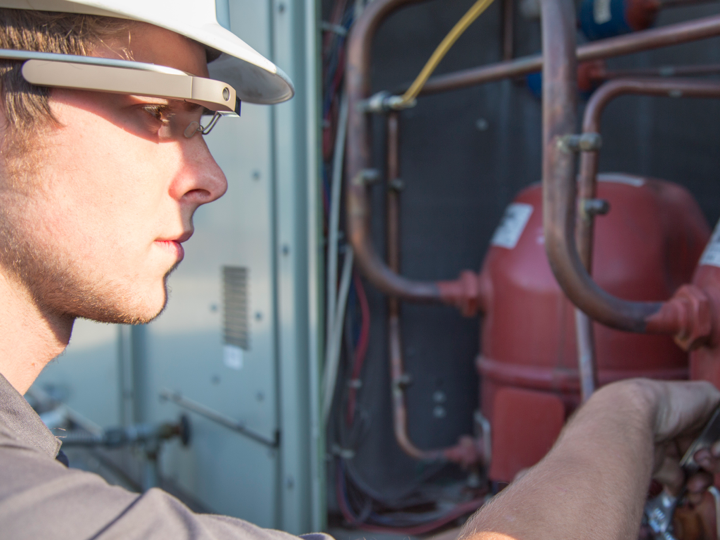
There is less difference between our work and home devices, our tablets and our mobile phones. They are not meant for “work” or for the “home.” We just use them wherever we are. The idea of a balance or even the concept of an enterprise hardware manufacturer seems quaint.
The difference, really, is in the applications we choose to apply with these things we wear over our eyes and hold in our hands. Hardware like Google Glass and Atheer Labs 3D Augmented Reality glasses are all badass, of course. But the data is the special sauce that makes these tools work for us. Like the smartphone, augmented reality is also something neither for work or at home. Instead it’s a layer that can be applied to our home and work life.
And now just as we saw with smartphone and tablets, examples are emerging that show how augmented reality is applying in universal ways.
For example, in the workplace the complexity of repair gets simplified when the various mechanical parts get treated as something digital. An animated wrench can be shown how to be used on a piece of heavy equipment that has also been rendered into a data object. Like smartphones, augmented reality can be used anywhere to get work done.
ResolutionTube, a TechStars Seattle startup, has raised $1.5 million in seed funding for an augmented reality app that helps the technician fix everything from a heating vent to sophisticated medical equipment. Madrona Ventures led the investment with participation from TechStars CEO David Cohen and other angel investors.
The company is targeting the field services market with a knowledge base and a smartphone app that a technician can use to fix things without needing to call a toll-free number for help. Instead, the technician can use the app to scan the serial number that connects to the ResolutionTube knowledge base. If the technician gets stuck, the app can be used to contact an expert who connects with the the technician over video. The technician uses the smartphone camera to show the expert the machinery in question. That is followed with some advice and use of a whiteboard to draw and show what the technician needs to do for the issue to get resolved.
ResolutionTube will use the funding to develop new advanced product features like as superimposing 3D models into video. The vision is to create an augmented reality experience that instructs people how to repair items simply by pointing a device at whatever needs to be fixed. Currently the app listens to the worker and the expert. It then pulls out keywords that gets stored in the knowledge base. The next step is to use natural language processing so the entire conversation can be added to the ResolutionTube information network. The transition will help ResolutionTube answer questions more so than provide a search capability.
The company is also creating a prototype app on Google Glass. With wearables they can work and get the instructions without having to use their hands to hold a device. Companies like Vuzix have even developed their own eyewear, showing how the market is expanding for augmented reality technologies to serve a workforce that has almost universal connectivity.
Metaio provides another example for how augmented reality is changing the way people work. The company developed an augmented reality app for technicians to do service and repair work on the Volkswagen XLI, the company’s latest concept car. The app shows the technician how to repair the car without any prior training.
Devices now enable augmented reality in the way people have always wanted to experience it, said Occipatal Co-Founder Vikas Reddy in an email interview. The company has developed Structure, a 3D sensor that customers can strap to the back of their iPads. The 3D sensor, small enough to fit in your pocket, has an SDK for developers to build consumer-facing apps that take advantage of 3D data.
The future of augmented reality is tied to devices like the iPad. But that’s just the foundation for a next generation of apps. These apps will leverage endless stores of data that will take the form of physical objects and provide people with expert knowledge that will be immediately available. This will allow us to see the world in whole new ways and forever transform how we live and work.